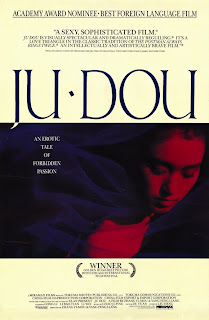Ju Dou (Zhang Yimou and Yan Fengliang, 1990)
Shot in a bright Technicolor in 1990. You read right, it was shot in this old process by Zhang Yimou and Yan Fengliang. It is the tragic story of the old man (Li Wei) who owns a cloth dyer place and has bought himself a wife called Ju Dou (Gong Li), well it’s his third, to get a pair of hands to work with him, a heir, and a sexual slave. His nephew (Li Baotian) is a good hearted forty years old man who works for him. It is pretty obvious that this story won’t end happily and that the title character and the nephew will get together in the back of the cruel uncle.
This is the story of the stable boy who wants the princess that is kept by a mad man. In fact, the story exposes how the stable boy gets the princess and how things can get very complicated. The Technicolor process used by the filmmakers is quite obvious in the demonstration of their influence from the great melodramas of the 1950’s of Douglas Sirk notably. The story has a sense of classic melodrama and also more than a touch of Greek tragedy. Zhang Yimou, especially, is indeed a Chinese director but he has a deep American influence in his films and his knowledge of classic films is pretty impressive. He likes to juxtapose a plot into a Chinese context. Just like his retelling of Akira Kurosawa’s Rashomon in his great wire-fu film Hero.
Just like his other films, Ju Dou is a very beautiful film to look at and the long colored cloths that are drying give vibrant colors to his already well done use of the Technicolor. The composition of the image is inspired and the sets of the cloth dyer is an interesting universe.
It is not the most famous Asian film of all time, but it has been nominated at the Oscars as Best Foreign Film and it is present on the list of 1000 Greatest Films of All Time. It deserves its place on the list for all the reasons mentioned before, but I would not rank it higher than its current place, around 887th. A plot as classic as this becomes predictable and after the first act I kind of seen where the movie was going and I got no real surprises with the evolution of the story. It is well done and I was keen to see what Yimou has done before his most famous films Hero and House of Flying Daggers. Still, I would recommend to watch it for its execution and the superb cinematography.



No comments:
Post a Comment